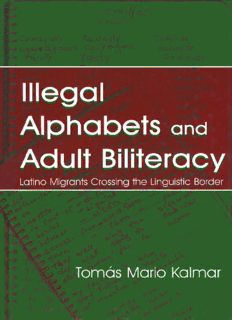
Illegal Alphabets and Adult Biliteracy: Latino Migrants Crossing the Linguistic Border PDF
Preview Illegal Alphabets and Adult Biliteracy: Latino Migrants Crossing the Linguistic Border
Illegal Alphabets and Adult Biliteracy Latino Migrants Crossing the Linguistic Border Illegal Alphabets and Adult Biliteracy Latino Migrants Crossing the Linguistic Border Tomás Mario Kalmar LAWRENCE ERLBAUM ASSOCIATES, PUBLISHERS Mahwah, New Jersey London This edition published in the Taylor & Francis e-Library, 2008. “To purchase your own copy of this or any of Taylor & Francis or Routledge’s collection of thousands of eBooks please go to www.eBookstore.tandf.co.uk.” Copyright © 2001 by Lawrence Erlbaum Associates, Inc. All rights reserved. No part of this book may be reproduced in any form, by photostat, microform, retrieval system, or any other means, without the prior written permission of the publisher. Lawrence Erlbaum Associates, Inc., Publishers 10 Industrial Avenue Mahwah, NJ 07430 Cover design by Kathryn Houghtaling Lacey Library of Congress Cataloging-in-Publication Data Kalmar, Tomás Mario, 1942– Illegal alphabets and adult biliteracy: Latino migrants crossing the linguistic border/ by Tomás Mario Kalmar p. cm. Includes bibliographical references (p.) and index. ISBN 0-8058-3626-8 (c: alk. paper)—ISBN 0-8058-3627-6 (p: alk. paper) 1. English language—Study and teaching—Spanish speakers. 2. English language— Study and teaching—United States. 3. Hispanic Americans—Education—Language arts. 4. Languages in contact—United States. 5. English language—Self-instruction. 6. English language—Adult education. 7. Hispanic Americans—Language. 8. Bilingualism—United States. 9. English language—Alphabet. PE1129.S8 K28 2000 428’.0071’073–dc21 99–089851 The final camera copy for this work was prepared by the author, and therefore the publisher takes no responsibility for consistency or correctness of typographical style. However, this arrangement helps to make publication of this kind of scholarship possible. ISBN 1-4106-0572-8 Master e-book ISBN para mamacita bruja letrada CONTENTS Gracias/Acknowledgments i Foreword iii James Paul Gee Prologue 1 1 No Man’s Land 4 I Líricamente 4 II The Death of Leonardo 11 III DOLÓ DASNT PROTECT AS 13 2 The Cobden Glossaries 35 I Constructing a Hybrid Alphabet 36 II A Kind of Algebraic Notation 41 III New Contexts, New Texts, Same Moves 42 IV A Scene of Writing: The Village Hall 46 V The Cobden Glossaries 52 3 Some Laugh, Others Frown 56 I “Is This Text a Joke, or What?” 57 II Cracking the Ninth-Century Code 61 III Three Ways of Reading a Cobden Glossary 65 IV Freirean Dilemmas 68 V Wallerstein on the Case of the Codben Glossaries 73 VI Conclusion 81 4 Making It Legal: The Social Construction of Hybrid Alphabets 82 I Strictly Speaking: Emic vs Etic 83 II Writing in the No-Man’s Land Between Languages 89 III How to Legitimize a Hybrid Alphabet 94 Epilogue: A Game as Old as the Alphabet? 113 References 117 Author Index 123 Subject Index 125 Gracias/Acknowledgments Into this book I have poured twenty years of life shared with friends and strangers. As it goes to press I celebrate con mucho cariño y respeto the memory of my dear friend, the late Alfred Schenkman. In 1983, just before he died, Alfred published five hundred copies of The Voice of Fulano. It took twelve more years to legitimize the conversion of that slim volume of miscellaneous bilingual field notes into the doctoral dissertation which—with barely any changes—you, dear Reader, now hold in your hand. I thank the many communities who taught me to value the intellectual labor of alfabetización, and I thank the various institutions that helped legitimize the tale I tell. At the Harvard Graduate School of Education, Joe Maxwell taught me integrity. Carol Chomsky persuaded me not to omit the technical linguistic details. Jim Gee persuaded me to Discourse the Harvard way. Donaldo Macedo helped exorcise my reluctance to do so. And when the rites of passage got tough, Hanna Fingeret nourished my courage. The Spencer Foundation blessed the production of this book with a generous Doctoral Dissertation Fellowship. Deepest gratitude to Catherine Lacey! The Illinois Times, the St. Louis Mercantile Library at the University of Missouri-St. Louis, and the Southern Illinoisan kindly granted permission to reproduce the articles pp. 10, 27–28, and 29–35 respectively. Dover Publications granted permission to reproduce the glossary on p. 96, and MIT Press the glossaries on pp. 103–104. Lifelong gratitude to Silja Kallenbach, to Beatriz McConnie Zapater, and to Barbara Newman. And gracias to all the other folks in the original fourteen ALIPs of the Boston Adult Literacy Initiative, and to the people at UMass/Boston and Roxbury Community College who supported the work of the Boston Adult Literacy Resource Institute in its first five years. Also to the Lawrence Literacy Coaltion, and to Luis Prado of Alianza Hispana, and all the folks there. Peg and Steve Falcone and Joe Liberto first welcomed my family and me to Carbondale. Jennifer FauntLeRoy provided a home for my two sons and me—and Pobblesquatch—and, while tornados whirled us around, delivered babies in the backwoods. The good people of Cobden and Anna and Carterville taught me what it takes to desegregate a community poco a poco, one move at a time. Kaye Weatherford persuaded me that I could choose to see what others see. Alex Paull, Steve Baker, Cathy Signorelli and the rest of the Carbondale Leonard Peltier Support Group taught me solidarity. And Patti and Kevin and Hugh and Bob and Dave and the Oakland Avenue gang kept me yodeling. Y más que nunca, sueño con todos los compadres y todos sus familiares, tanto en Cherán como en Illinois. Primeramente con Kim y Steve Titus, y don Fidel y doña Concepción Bartolo y mi ahijadita Margarita, y también Garth Gillan, y Pánfilo y Sara Queriapa y sus familiares, y las familias de Catalina Roman, de don José Gomez, y de todas las pioneras de Su Casa Migrant Head Start Day Care Center, y Salvador Tehandón, y Margarita Garcia, y muchos muchos más que aqirĺ no se puede ni nombrar. i
Description: